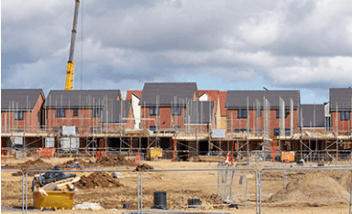Two weeks after the general election, Britain has a new Labour government that is promising to put economic growth and stability at the heart of their administration. But after a campaign that was light on detailed policy, what do we know about how they plan to achieve these aims? This week’s King’s Speech—when the monarch announces the government’s agenda to Parliament—revealed the new laws and legislation that the ruling party will introduce over the next 12 months and beyond.
How will the property sector be affected?
As specialists in property finance and investment, we look at the announcements that will shape the sector over the coming years. Labour’s headline pledge going into the election was to deliver 1.5million new homes over the next 5 years, primarily through supply side reform.
Planning system reform
With new homes such a priority, overhauling Britain's planning system has emerged as a key strategy. The current system is discretionary planning, meaning that local authorities assess the merits of each application rather than following a set of predetermined rules or zoning codes. This often leads to delayed or rejected proposals and inhibits certainty throughout the development process. It also distorts land prices based on the level of permission the plot has attained.
For a top-down target (namely 1.5 million homes) to be achieved, it’s clear that radical change will be needed. But we don’t yet know what shape a new planning system will take. A streamlined process has been promised, covering housing, new towns, and infrastructure and transport projects. There has also been an abundance of speculation on whether Labour will reclassify low-value parts of the Green Belt to open them up for development, but we’re not at the stage of seeing exactly what this will entail.
Plans to reform compulsory purchase order (CPO) compensation will make it easier and more affordable for public bodies to buy land and develop both infrastructure and housing.
These proposed measures will encourage investment in the property sector, but do not wholly address some of constraints we’ve seen over recent years, namely build cost inflation and labour shortages. As a provider of development finance, Shojin looks forward to increased housebuilding activity, but we remain wary that there are others issues in the supply chain that need attention.
Jatin Ondhia, CEO, comments: “Announcing planning reforms and encouraging investment was necessary; however, now we need concrete and robust plans to meet housebuilding targets. Rhetoric alone won’t suffice — Housing Minister Matthew Pennycook has a long 'to-do list', and he must support the construction sector by mobilising the financial resources needed to realise these plans.”

Leasehold and freehold system reform
Less radical is the Leasehold and Commonhold Reform Bill, an updated version of the Conservative government’s Leasehold Reform Bill that was repeatedly delayed.
Labour is putting legislation in place to transition from leasehold to a commonhold system, where homeowners have perpetual ownership and share responsibility for communal areas in multiple-occupancy buildings such as apartment blocks.
While this may increase value for homeowners, there is concern that such reform could affect the value of property investments, including those from institutions such as pension funds. If existing leaseholders convert to commonhold, a landlord’s long-term income from ground rents and lease extensions will be reduced. Alternatively, a commonhold system may make the overall market more dynamic, increasing the attractiveness of apartments and driving demand.
Private renting
Another return for a previous bill, Labour intend to see through the Renters’ Reform Bill which was championed by Michael Gove as part of the Levelling Up agenda, but which faced resistance from landlord lobbies and Conservative backbenchers. With the huge amount of private renters in the UK (over 11 million), offering this group increased protection has been a pragmatic option for both major parties.
The main function of this bill is to end Section 21 “no fault” evictions and give renters more stability. This will take power away from private landlords and has often been seen as part of a long-term move to drive a more “professional” landlord sector, including more build-to-rent developments.
As it stands, there are no plans from central government to introduce rent controls, but the door on this hasn’t been closed completely. With Labour's pledge to devolve more power to regional mayors and combined authorities, we can’t completely discount the advocacy for rent control measures from high-profile mayors such as Sadiq Khan and Andy Burnham. However, the effect of introducing rent regulation in just a few cities would surely deter investors and prove highly controversial.
In conclusion, the intent to stimulate housebuilding while creating a fairer, more accessible property sector is something we can support. However, the real estate market is very complex, and increasing supply alone will not necessarily affect affordability, with land costs, construction cots, investor demand and market segmentation among other factors.
As both a lender and an investment platform, Shojin backs any steps that will create a stable market. It is also vital to making the UK an attractive place to live and do business; according to Jatin: ““The importance of building more homes to the economy cannot be overstated. By attracting international investment and strengthening partnerships with the private sector, the UK can achieve sustainable growth in the real estate sector and beyond, revitalising the whole economy.”



















